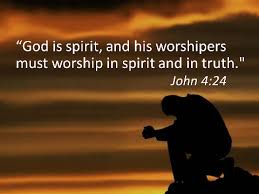John 4:24 (NET)
“God is spirit, and the people who worship him must worship in spirit and truth.”

These are the words of Jesus as He was talking with a Samaritan woman confused about worship. She was confused about the location where “worship” should be carried out, whether it was on a mountain where her ancestors worshipped or in Jerusalem. The way Jesus answers is so challenging and freeing at the same time! I love this passage and yet I still do not fully understand its implications for me and the Church today.
Jesus tells her that a time is coming when we will neither worship God in Jerusalem or on a mountain (which I believe to be the time when we will be in Heaven), but for now we should worship God in spirit and truth – because this is what God the Father is seeking! So, what does that look like? Spirit and truth? I will try to unpack this question in the next two or three posts, so lets get into part one – Worship God in Spirit.
Part 1
As human beings we are made up of body, soul, and spirit. In the Scriptures, “spirit” is the heart and life of a person. It literally refers to “that which gives life to the body” (among other things). According to Mounce’s Complete Expository Dictionary of Old and New Testament Words, “it is that aspect of a person which God most immediately encounters [us], and where a person is most immediately open and responsive to God” – in the spirit.
In the Old Testament we see that worship was primarily an act of adherence to the prescribed methods and instructions of the law. It was very ritualistic and needed to be carried out with precision or else it was not accepted. The emphasis was not necessarily placed on the inward expression of worship from a changed heart and spirit that was completely submitted to God (although that was God’s intention), but was very much about the external conformity to rituals and traditions. The Jews missed the point! They were focused on the wrong things, and I believe that we can be trapped into the same things today – missing the whole point of worship.
David tells us in Psalm 51:17 that God does not desire the sacrifices of bulls and goats, but that a broken and contrite spirit is what He desires and will not reject. So, we have a clue of what is pleasing and acceptable to God in worship. A broken spirit and a heart that is humble enough to receive the transformation that God desires to give us by His mercy and grace.
Anyone that has worked with horses understands the frustration that comes along with trying to “break” the horse enough to get it to a place where it can be ridden. What are you trying to “break”, its spirit, right? The horse is not able to be of use to anyone when it doesn’t have a spirit that is willing to come under the direction and leadership of its master. Well we are the same way in regard to our trust and reliance upon God. We must be broken of our own pride and will, and must be ready to submit our spirit/will to the Lordship of Christ before our worship will mean anything of any significance to God. Psalm 32:9 tells us not to be like a horse/mule that have to be harnessed with a bit and bridle before they come to you, in other words don’t be stubborn spirited. Submit your spirit to God and this will free up your worship of Him!
Today, as we realize the gift of salvation and new life in Christ, our capacity to worship is limitless! We have the fulfillment of what the law and prophets were pointing to – Jesus Christ and the promise of His Spirit within us who call upon Him to save us. He has given us new “life” in His name, and when we worship God we have the Holy Spirit that is bringing to life that regenerated Spirit within us. Our worship should be full of life and energy, spirited. We should be characterized by liveliness and free in our expressions of worship in our lives.
David was someone in the Old Testament that was “spirited” in his worship and devotion to God. In 1 Samuel when his wife was turned off by his expressions of worship to the Lord, he responded to her by saying that he was “willing to shame and humiliate (himself) even more than (he had)”, because it was “before God” that he danced and celebrated the favor of God upon him and the nation of Israel. I believe that he was worshiping in spirit at that time! Now, I wouldn’t encourage people to make themselves into a mockery and humiliate themselves as a way to worship in Spirit, but I would ask if the way in which you worship is full of life and energy – or is it dead? I think this is the heart behind worship in spirit.
When we only worship in the appointed times set apart for it (e.g. 8:30am Sundays, Wednesday evenings, at dinner time, etc.), I believe we miss the heart/spirit of true worship. Paul says to rejoice always, pray without ceasing, and to give thanks always in all situations! That is a lifestyle. It is not ritualistic in nature, it is dynamic! It is full of spirit! He also says in Eph. 5:19 & Colossians 3:16 to sing to one another and to make music in our hearts to the Lord – teaching each other with spiritual songs! Worshiping in spirit is all throughout the Scriptures, and each of us should be interested in and pursuing what its implications are for us individually and corporately.
I will say that some believe this to be speaking of certain gifts of the Spirit, like tongues, and/or prophecies. Now, I do not have much to say about this except to say that if this is how you interpret this verse then I believe that you have missed the spirit of worship all together. Worship is not restricted to or determined by the expression of gifts or the lack thereof. It is a lifestyle, and for us to reduce the expressions of “true” worship to the expressions and functions of these gifts is to do a real disservice to the heart of worship. I do absolutely believe in the functions of the gifts of the Spirit as described in the Scriptures, but I do not believe that we can judge the authenticity and sincerity of an individuals worship by the way in which they express their worship through gifts. Some are silent, some raise hands, some jump up and down, some kneel, and so-on – all of which is up to the individual and must be kept that way. Whenever we try to conform congregations into our methodology and traditions, then I believe that we put ourselves into the same place as the Samaritan woman where we start questioning the legitimacy of the expression of worship by the Jews/fellow believers. What some consider spirited worship is considered heresy by others, and what they consider expressive and spirited would be considered too liturgical and rote for yet others. This, I believe, is the reason that there are so many unfortunate and uncalled for divisions within the body of Christ today. A quick search and this is what I find,
“There are more than 200 distinct Christian bodies/denominations in just the united Sates (This listing is based on information from Hill, Samuel S. and Mead, Frank S. Handbook of Denominations in the United States (Abingdon, 1994).
This is mostly due to differences in doctrine and worship styles. That is so sad and does nothing good for the witness of what is supposed to be a united Church of Christ.
So, as you can see there are so many ways that this teaching can be interpreted, but we must be extremely careful in how we approach this topic. On the other hand, we must also encourage and look for ways to bring life and energy to our personal forms/expressions of worship. If you don’t raise your hands (see Psalm 77:2, Deuteronomy 32:40, Genesis 14:22, 1 Timothy 2:8, and more) , why not? If you do not sing along during the Worship Service at your church (Col. 3:16, Eph. 5:19, and a ton of Psalms commanding us to sing!), why not? Do you pray during the day without needing to be knelt down, or in front of a dinner plate – do you have an ongoing dialogue with God? What is stopping you from expressing your love and worship to God with all of your heart and full of spirit? Start today worshiping the Lord in Spirit.
In part two, we will look at what worshiping in Truth looks like. I hope that this helps you understand the worship of God in Spirit. God bless you.


